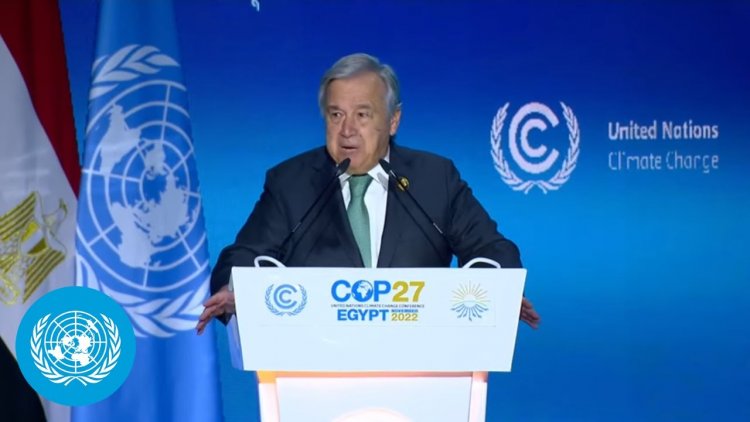UN Secretary-General welcomes the decision to establish a loss and damage fund
At the conclusion of the COP27 or the annual Conference of Parties to the UN Framework Convention on Climate Change (UNFCCC) in Sharm el-Sheikh on November 20, UN Secretary-General António Guterres welcomed the decision to establish a loss and damage fund and to operationalize it in the coming period. He said, “Clearly this will not be enough, but it is a much-needed political signal to rebuild broken trust.”

At the conclusion of the COP27 or the annual Conference of Parties to the UN Framework Convention on Climate Change (UNFCCC) in Sharm el-Sheikh, Egypt, on November 20, UN Secretary-General António Guterres welcomed the decision to establish a loss and damage fund and to operationalize it in the coming period. He said, “Clearly this will not be enough, but it is a much-needed political signal to rebuild broken trust.”
Guterres thanked the hosts – the Egyptian government and COP27 President Sameh Shoukry – for their hospitality. “I also want to recognize Simon Stiell (Executive Secretary of UNFCCC) and the United Nations Climate Change team for all their efforts,” he added.
COP27 took place not far from Mount Sinai, a site that is central to many faiths and to the story of Moses, or Musa. Guterres said, “It’s fitting. Climate chaos is a crisis of biblical proportions. The signs are everywhere. Instead of a burning bush, we face a burning planet.”
Guterres said that the conference had been driven by two overriding themes: justice and ambition. “Justice for those on the frontlines who did so little to cause the crisis – including the victims of the recent floods in Pakistan that inundated one-third of the country. Ambition to keep the 1.5-degree limit alive and pull humanity back from the climate cliff.”
According to Guterres, “this COP has taken an important step towards justice. The voices of those on the frontlines of the climate crisis must be heard. The UN system will support this effort every step of the way.”
Guterres said that justice covered several other things: finally making good on the long-delayed promise of $100bn a year in climate finance for developing countries; clarity and a credible roadmap to double adaptation finance; changing the business models of multilateral development banks and international financial institutions; etc.
However, Guterres cautioned, “Our planet is still in the emergency room. We need to drastically reduce emissions now – and this is an issue this COP did not address. A fund for loss and damage is essential – but it’s not an answer if the climate crisis washes a small island state off the map – or turns an entire African country to desert. The world still needs a giant leap on climate ambition.”
Guterres drew attention to the “red line” of a temperature limit of 1.5 degrees. For this, he said that “we need to massively invest in renewables and end our addiction to fossil fuels. We must avoid an energy scramble in which developing countries finish last – as they did in the race for COVID-19 vaccines. Doubling down on fossil fuels is double trouble. The Just Energy Transition Partnerships are important pathways to accelerate the phasing out of coal and scaling up renewables.”
It was in view of the scale of the problem that Guterres was “pushing so hard for a Climate Solidarity Pact. A Pact in which all countries make an extra effort to reduce emissions this decade in line with the 1.5-degree goal. And a Pact to mobilize – together with International Financial Institutions and the private sector – financial and technical support for large emerging economies to accelerate their renewable energy transition.”
Next month’s UN Biodiversity Conference, Guterres felt, “is the moment to adopt an ambitious global biodiversity framework for the next decade, drawing from the power of nature-based solutions and the critical role of indigenous communities.”
“Unlike the stories from the Sinai peninsula, we cannot wait for a miracle from a mountaintop,” concluded Guterres. “It will take each and every one of us fighting in the trenches each and every day. Together, let’s not relent in the fight for climate justice and climate ambition. We can and must win this battle for our lives.”
Csaba Kőrösi, President of the 77th session of the UNGA, also welcomed the successful conclusion of COP27. He said, “As the President of the General Assembly, I will work with Member States to support the implementation of the COP outcomes and follow the charted path forward. An integrated climate-water-food policy is the only way to secure a future for a global population of 8bn and counting.”
“The General Assembly will build on the results of Sharm al-Sheikh to transform the world towards sustainable development and well-being,” Kőrösi assured.



 Join the RuralVoice whatsapp group
Join the RuralVoice whatsapp group









































